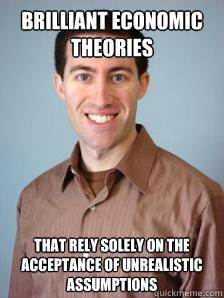Attending economics seminars — a total waste of time! Visiting economics conferences and seminars, the sessions usually start with the presentation of mathematical-statistical models building on assumptions somewhat analogous to “let us assume that people are green and descending from Mars” — and then long technical discussions follow on how good these models are at making us better understand contemporary societies and economies. Yours truly finds it extremely hard to see we should at all pay attention to and waste time on modelling societies and economies assuming things like ‘rational expectations’, ‘representative agents’, calculable uncertainties, ergodicity, ‘common knowledge’, ‘infinitely-lived dynasties’, ‘modern-macro Euler equations’,
Topics:
Lars Pålsson Syll considers the following as important: Economics
This could be interesting, too:
Lars Pålsson Syll writes Schuldenbremse bye bye
Lars Pålsson Syll writes What’s wrong with economics — a primer
Lars Pålsson Syll writes Krigskeynesianismens återkomst
Lars Pålsson Syll writes Finding Eigenvalues and Eigenvectors (student stuff)
Attending economics seminars — a total waste of time!
 Visiting economics conferences and seminars, the sessions usually start with the presentation of mathematical-statistical models building on assumptions somewhat analogous to “let us assume that people are green and descending from Mars” — and then long technical discussions follow on how good these models are at making us better understand contemporary societies and economies.
Visiting economics conferences and seminars, the sessions usually start with the presentation of mathematical-statistical models building on assumptions somewhat analogous to “let us assume that people are green and descending from Mars” — and then long technical discussions follow on how good these models are at making us better understand contemporary societies and economies.
Yours truly finds it extremely hard to see we should at all pay attention to and waste time on modelling societies and economies assuming things like ‘rational expectations’, ‘representative agents’, calculable uncertainties, ergodicity, ‘common knowledge’, ‘infinitely-lived dynasties’, ‘modern-macro Euler equations’, ‘overlapping generations of fixed size’, ‘wages determined by Nash bargaining’, ‘endogenous job openings’, etc., etc.
Without those patently absurd assumptions, the models presented and discussed deliver nothing. The assumptions matter crucially, and not even extreme idealizations in the form of invoking non-existent entities such as ‘hypothetical super populations or ‘actors maximizing expected utility’ delivers. Change only one of the assumptions and something completely different may happen.
 Thirty years ago one of my intellectual heroes, Phil Mirowski, was invited to give a speech on themes from his book More Heat than Light at my old economics department in Lund, Sweden. All the mainstream professors were there. Their theories and model assumptions were totally mangled and no one — absolutely no one — had anything to say even remotely reminiscent of a defence. Being at a nonplus, one of them, in total desperation, finally asked: “But what shall we do then?”
Thirty years ago one of my intellectual heroes, Phil Mirowski, was invited to give a speech on themes from his book More Heat than Light at my old economics department in Lund, Sweden. All the mainstream professors were there. Their theories and model assumptions were totally mangled and no one — absolutely no one — had anything to say even remotely reminiscent of a defence. Being at a nonplus, one of them, in total desperation, finally asked: “But what shall we do then?”
Yes indeed — what shall they do? Because, sure, they have to do something. Before they come up with something better than the present fictional mainstream economics storytelling there is little reason for any of us to attend their seminars and conferences.
